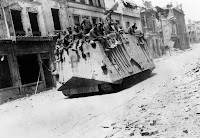By my reckoning, it has been about 17 years since the fall board last came down upon the keys, and those punchy, upbeat little piano numbers stopped wafting through the hallway and into the kitchen, lounge, and down the street. In their place came increases in homework, then exams, then coursework, then more exams, then dissertations, and then exams, then work. Never had the care-free days of childhood seemed so far away when, for what seemed like hours, one would sit upright on the stall and bash out those most popular and well-known of tunes -
The Phantom of the Opera,
In The Hall of the Mountain King (that's the Alton Towers music to us), not to mention my personal favourite,
The Entertainer, roundly criticised by some in the family for being too loud, perhaps not played with enough finesse, but still pretty good for an 11-year-old, and one that, at one time, I could probably have played blindfolded.
How unkind have the years been that this is no longer the case, but one thing I have retained is an enthusiasm for the piano, and an unwritten covenant with myself that, some day, I would return to this most beautiful of instruments. Quite fortunate, then, that Lizzie's parents are moving house, for in amongst the inevitable clear out has come Lizzie's old, but incredibly good quality, keyboard. Featuring over 50 different instrument personas, more backing beats than you can shake a stick at, and a hundred pre-loaded tunes to make it look like you've mastered playing perfection, it's an electronic masterpiece that just has to be explored! No, it doesn't match the romance or beauty of a grand piano, but it's certainly more functional for our second-floor flat.

And so, here we are, mid-January 2014, the dawn of a new era, Nich Turner scrabbling around the music scores of a "basics to expert" piano book, furrowing his brow in an attempt to reacquaint himself with the positions of notes, crotchets, semibreves, minims, quavers, bars, treble clefs, bass clefs, flats, sharps, and naturals. It's difficult, frustrating, and oh-so confusing, but I'm absolutely loving being back at the keys after so many years, and this time, there's no homework to get in the way. So watch out world, I'm tickling the ivories once again; and look out Mum -
the Entertainer has returned!

















.png)




